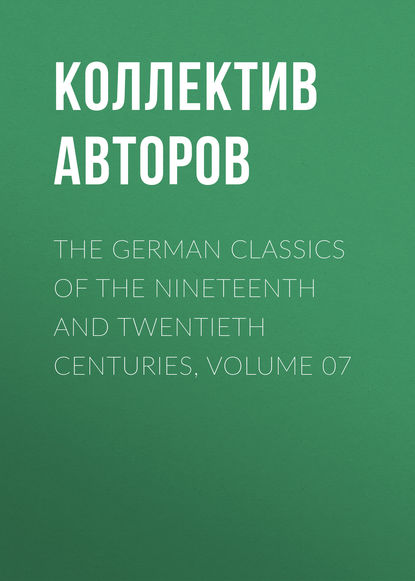По всем вопросам обращайтесь на: info@litportal.ru
(©) 2003-2024.
✖
The German Classics of the Nineteenth and Twentieth Centuries, Volume 07
Настройки чтения
Размер шрифта
Высота строк
Поля
(Erinna was a Greek poetess, a friend and pupil of Sappho of Lesbos.
She died at the age of nineteen.)
"Many the paths to Hades," an ancient proverb
Tells us, "and one of them thou thyself shalt follow,
Doubt not!" My sweetest Sappho, who can doubt it?
Tells not each day the old tale?
Yet the foreboding word in a youthful bosom
Rankles not, as a fisher bred by the seashore,
Deafened by use, perceives the breaker's thunder no more.
—Strangely, however, today my heart misgave me. Attend:
Sunny the glow of morn-tide, pouring
Through the trees of my well-walled garden,
Roused the slugabed (so of late thou calledst Erinna)
Early up from her sultry couch.
Full was my soul of quiet, although my blood beat
Quick with uncertain waves o'er the thin cheek's pallor.
Then, as I loosed the plaits of my shining tresses,
Parting with nard-moist comb above my forehead
The veil of hair—in the glass my own glance met me.
Eyes, strange eyes, I said, what will ye?
Spirit of me, that within there dwelled securely as yet,
Occultly wed to my living senses—
Demon-like, half smiling thy solemn message,
Thou dost nod to me, Death presaging!
—Ha! all at once like lightning a thrill went through me,
Or as a deadly arrow with sable feathers
Whizzing had grazed my temples,
So that, with hands pressed over my face, a long time
Dumb-struck I sat, while my thought reeled at the frightful abyss.
Tearless at first I pondered,
Weighing the terror of Death;
Till I bethought me of thee, my Sappho,
And of my comrades all,
And of the muses' lore,
When straightway the tears ran fast.
But there on the table gleamed a beautiful hair-net, thy gift,
Costly handwork of Byssos, spangled with golden bees.
This, when next in the flowery festal season
We shall worship the glorious child of Demeter,
This will I offer to her for thy and my sake,
So may she favor us both (for she much availeth),
That no mourning lock thou untimely sever
From thy beloved head for thy poor Erinna.
* * * * *
MOZART'S JOURNEY FROM VIENNA TO PRAGUE (about 1850)
A ROMANCE OF HIS PRIVATE LIFE
BY EDUARD MÖRIKE
TRANSLATED BY FLORENCE LEONARD
In the fall of the year 1787 Mozart and his wife undertook a journey to Prague, where he was to finish and bring out his masterpiece, Don Juan.
Eleven o'clock of the fourteenth of September found them well on their way and in the best of spirits. They had been traveling two days, and were about one hundred and twenty miles from Vienna, among the beautiful Mährische mountains. The splendid coach, drawn by three post-horses, belonged to an elderly Frau Volkstett, wife of General Volkstett, who prided herself on her intimacy with the Mozarts and on the favors she had shown them. The carriage was painted a bright yellowish-red, the body adorned with garlands of gay-colored flowers, the wheels finished with narrow stripes of gold. The high top was fitted with stiff leather curtains, now drawn back and fastened.
The dress of the travelers was simple, for the new clothes to be worn at court were carefully packed in the trunk. Mozart wore an embroidered waistcoat of a somewhat faded blue, his ordinary brown coat—with a row of large, curiously fashioned gilt buttons—black silk stockings and small-clothes, and shoes with gilt buckles. As the day grew warm, unusually warm for September, he had taken off both hat and coat and was sitting in his shirt-sleeves, bare headed, serenely chatting. His thick hair, drawn back into a braid, was powdered even more carelessly than usual.
Frau Mozart's hair, a wealth of light brown curls, never disfigured by powder, fell, half unfastened, upon her shoulders. She wore a traveling-suit of striped stuff—light green and white.
They were slowly ascending a gentle slope, where rich fields alternated with long stretches of woodland, when Mozart exclaimed: "How many woods we have passed every day of our journey, and I hardly noticed them, much less thought of going into them! Postilion, stop and let your horses rest a bit, while we get some of those blue-bells yonder in the shade!"
As they rose to leave the coach they became aware of a slight accident for which the master had to take the blame. Through his carelessness a bottle of choice perfume had lost its cork, and its contents had run, unperceived, over clothing and carriage cushions. "I might have known it," lamented Frau Mozart, "I have smelled it this long while! Oh dear! A whole bottle of real 'Rosée d'Aurore!' I was as careful of it as if it had been gold!"
"Never mind, little goose," was Mozart's comforting answer. "This was the only way that your sacred smelling-stuff would do us any good. The air was like an oven here, and all your fanning made it no cooler. But presently the carriage was comfortable—you said it was because I poured a couple of drops on my jabot—and we could talk and enjoy our journey instead of hanging our heads like sheep in a butcher's cart. It will last all the rest of the way. Come now, let us stick our two Vienna noses into this green wilderness!"
They climbed the bank arm-in-arm, and strolled into the shade of the pines, which grew deeper and deeper, till only here and there a stray sunbeam lighted up the green mossy carpet. So cool was the air that Mozart soon had to put on the coat, which, but for his prudent wife, he would have left behind.
Presently he stopped and looked up through the rows of lofty tree-trunks. "How beautiful!" he cried. "It is like being in church! This is a real wood, a whole family of trees! No human hand planted them, but they seem to have come and stood there just because it is pleasant to live and grow in company. To think that I have traveled half over Europe, have seen the Alps and the ocean, and yet, happening to come into an ordinary Bohemian pine-woods, I am astonished that such a thing actually exists; not as a poetic fiction like the nymphs and fauns, but really living, drawn out of the earth by moisture and sunshine! Imagine the deer, with his wonderful antlers, at home here, and the mischievous squirrel, the wood-cock, and the jay!" He stooped and picked a mushroom, praised its deep red color and delicate white lines, and put a handful of cones into his pocket.
"Any one would think that you had never walked a dozen steps in the Prater," said his wife; "these same rare cones and mushrooms are to be found there too!"
"The Prater! Heavens, how can you mention it! What is there in the Prater but carriages and swords, gowns and fans, music and hubbub! As for the trees, large as they are—well, even the acorns on the ground seem like second cousins to the old corks lying beside them! You could walk there two hours, and still smell waiters and sauces!"
"Oh, what a speech from a man whose greatest pleasure is to eat a good supper in the Prater!"
After they had returned to the carriage and sat watching the smiling fields which stretched away to the mountains behind them, Mozart exclaimed: "Indeed the earth is beautiful, and no one can be blamed for wanting to stay on it as long as possible. Thank God, I feel as fresh and strong as ever, and ready for a thousand things as soon as my new opera is finished and brought out. But how much there is in the outside world, and how much at home, both wonderful and beautiful, that I know nothing about! Beauties of nature, sciences, and both fine arts and useful arts! That black charcoal-burner there by his kiln knows just as much as I do about many things. And I should like well enough to look into some subjects that aren't connected with my own trade!"
"The other day," interrupted his wife, "I came across your old pocket-calendar for '85. There were three or four special memoranda at the end. One read: 'About the middle of October they are to cast the great lions at the imperial brass foundry.' Another was underlined twice 'Call on Professor Gottner.' Who is he?"
"Oh Oh yes, I remember! That kind old gentleman in the observatory, who invites me there now and then. I meant, long ago, to take you to see the moon and the man in it. They have a new telescope, so strong that they can see distinctly mountains and valleys and chasms, and, on the side where the sun does not fall, the shadows of the mountains. Two years ago I planned to go there! Shameful!"
"Well, the moon will not run away!"
"But it is so with everything. It is too hard to think of all that one puts off and loses, not duties to God and to man only, but pure pleasures—those small innocent pleasures which are within one's grasp every day!"
Madame Mozart could not or would not turn his thoughts into another channel, and could only agree with him as he went on: "Have I ever been able to have a whole hour of pleasure with my own children? Even they can be only half enjoyed! The boys have one ride on my knee, chase me once around the room, and stop. I must shake them off and go! I cannot remember that we have had once a whole day in the country together, at Easter or Whitsuntide, in garden or woods or meadows to grow young again among the children and flowers. And meanwhile life is gradually slipping and running and rushing away from us! Dear Lord! To think of it!"
With such self-reproach began a serious conversation. How sad that Mozart, passionate as he was, keenly alive to all the beauties of the world, and full of the highest aspirations, never knew peace and contentment, in spite of all that he enjoyed and created in his short life. The reason is easily found in those weaknesses, apparently unconquerable, which were so large a part of his character. The man's needs were many; his fondness for society extraordinarily great. Honored and sought by all the families of rank, he seldom refused an invitation to a fête or social gathering of any sort. He had, besides, his own circle of friends whom he entertained of a Sunday evening, and often at dinner at his own well-ordered table. Occasionally, to the inconvenience of his wife, he would bring in unexpected guests of diverse gifts, any one whom he might happen to meet—amateurs, fellow-artists, singers, poets. An idle hanger-on whose only merit lay in his companionable mood or in his jests, was as welcome as a gifted connoisseur or a distinguished musician. But the greater part of his recreation Mozart sought away from home. He was to be found almost every afternoon at billiards in the Kaffeehaus, and many an evening at the inn. He enjoyed both driving and riding, frequented balls and masquerades—a finished dancer—and took part in popular celebrations also, masquerading regularly on St. Bridget's Day as Pierrot.
These pleasures, sometimes wild and extravagant, sometimes quieter in tone, were designed to refresh the severely taxed brain after extreme labors; and in the mysterious ways of genius they bore fruit in later days. But unfortunately he was so bent on enjoying to the full every moment of pleasure that there was room for no other consideration, whether of prudence or duty, of self-preservation or of economy. Both in his amusements and in his creative activity Mozart knew no limits. Part of the night was always devoted to composition; early in the morning, often even while in bed, he finished his work. Then, driving or walking, he made the rounds of his lessons, which generally took a part of the afternoon also. "We take a great deal of trouble for our pupils, and it is often hard not to lose patience," he wrote to one of his patrons. "Because we are well recommended as pianists and teachers of music we load ourselves down with pupils, and are always willing to add another; if only the bills are promptly paid it does not matter whether the new student be a Hungarian mustachio from the engineer corps, whom Satan has tempted to wade through thorough-bass and counterpoint, or the haughtiest little countess who receives us in a fury, as she would Master Coquerel, the hair-dresser, if we do not arrive on the stroke of the hour." So, when weary with the occupations of his profession, school-work, and rehearsals as well as private lessons, and in need of refreshment, he gave his nerves a seeming restorative only in new excitement. His health began to suffer, and ever-recurring fits of melancholy were certainly fostered, if not actually induced, by his ill health; and the premonition of his early death, which for a long time haunted him, was finally fulfilled. The deepest melancholy and remorse were the bitter fruits of every pleasure which he tasted; yet we know that even these troubled streams emptied pure and clear in the deep spring from which all joy and all woe flowed in marvelous melodies.

















